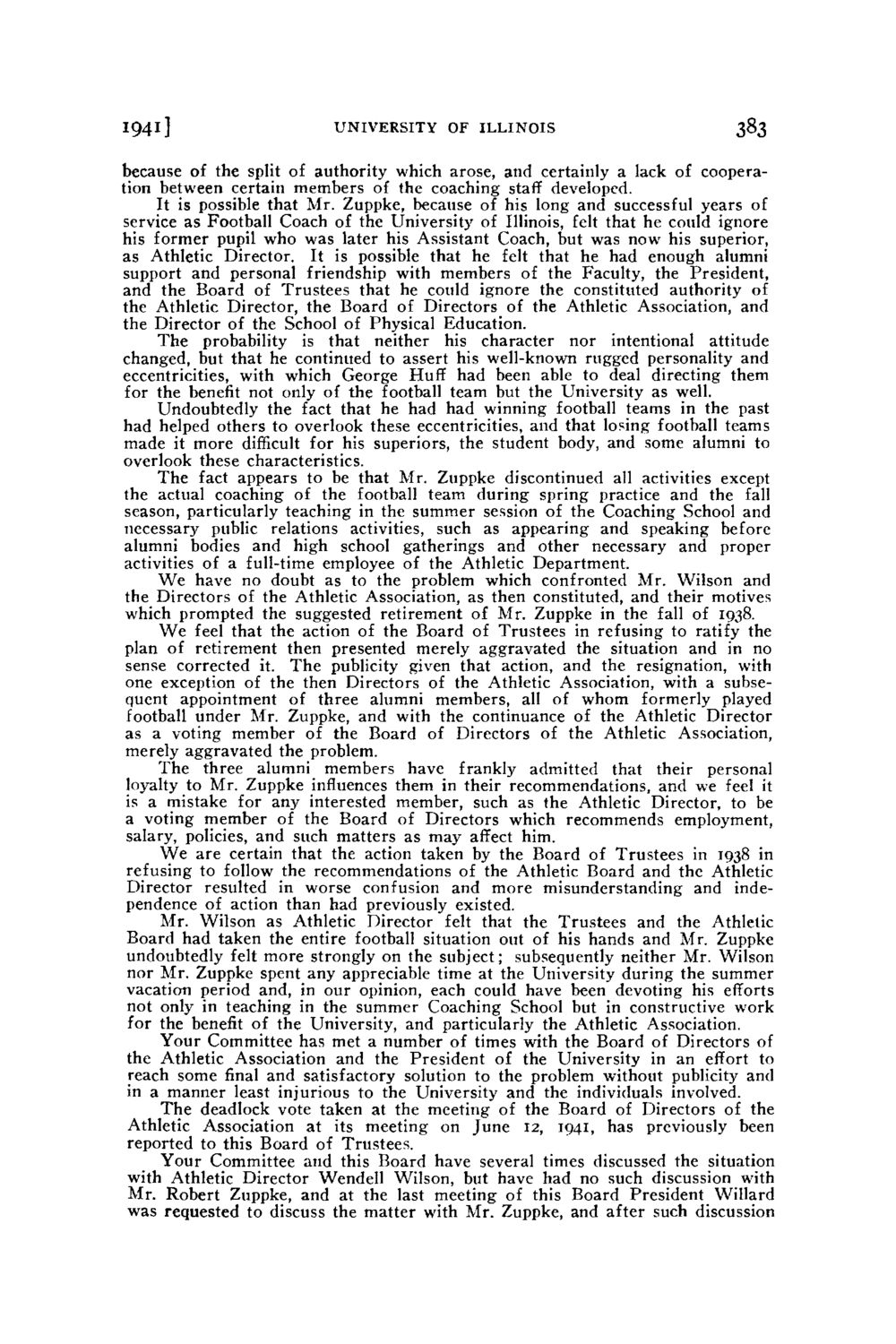| |
| |
Caption: Board of Trustees Minutes - 1942
This is a reduced-resolution page image for fast online browsing.

EXTRACTED TEXT FROM PAGE:
1941] UNIVERSITY OF ILLINOIS 383 because of the split of authority which arose, and certainly a lack of cooperation between certain members of the coaching staff developed. It is possible that Mr. Zuppke, because of his long and successful years of service as Football Coach of the University of Illinois, felt that he could ignore his former pupil who was later his Assistant Coach, but was now his superior, as Athletic Director. It is possible that he felt that he had enough alumni support and personal friendship with members of the Faculty, the President, and the Board of Trustees that he could ignore the constituted authority of the Athletic Director, the Board of Directors of the Athletic Association, and the Director of the School of Physical Education. The probability is that neither his character nor intentional attitude changed, but that he continued to assert his well-known rugged personality and eccentricities, with which George Huff had been able to deal directing them for the benefit not only of the football team but the University as well. Undoubtedly the fact that he had had winning football teams in the past had helped others to overlook these eccentricities, and that losing football teams made it more difficult for his superiors, the student body, and some alumni to overlook these characteristics. The fact appears to be that Mr. Zuppke discontinued all activities except the actual coaching of the football team during spring practice and the fall season, particularly teaching in the summer session of the Coaching School and necessary public relations activities, such as appearing and speaking before alumni bodies and high school gatherings and other necessary and proper activities of a full-time employee of the Athletic Department. W e have no doubt as to the problem which confronted Mr. Wilson and the Directors of the Athletic Association, as then constituted, and their motives which prompted the suggested retirement of Mr. Zuppke in the fall of 1938. W e feel that the action of the Board of Trustees in refusing to ratify the plan of retirement then presented merely aggravated the situation and in no sense corrected it. T h e publicity given that action, and the resignation, with one exception of the then Directors of the Athletic Association, with a subsequent appointment of three alumni members, all of whom formerly played football under Mr. Zuppke, and with the continuance of the Athletic Director as a voting member of the Board of Directors of the Athletic Association, merely aggravated the problem. The three alumni members have frankly admitted that their personal loyalty to Mr. Zuppke influences them in their recommendations, and we feel it is a mistake for any interested member, such as the Athletic Director, to be a voting member of the Board of Directors which recommends employment, salary, policies, and such matters as may affect him. W e are certain that the action taken by the Board of Trustees in 1938 in refusing to follow the recommendations of the Athletic Board and the Athletic Director resulted in worse confusion and more misunderstanding and independence of action than had previously existed. Mr. Wilson as Athletic Director felt that the Trustees and the Athletic Board had taken the entire football situation out of his hands and Mr. Zuppke undoubtedly felt more strongly on the subject; subsequently neither Mr. Wilson nor Mr. Zuppke spent any appreciable time at the University during the summer vacation period and, in our opinion, each could have been devoting his efforts not only in teaching in the summer Coaching School but in constructive work for the benefit of the University, and particularly the Athletic Association. Your Committee has met a number of times with the Board of Directors of the Athletic Association and the President of the University in an effort to reach some final and satisfactory solution to the problem without publicity and in a manner least injurious to the University and the individuals involved. T h e deadlock vote taken at the meeting of the Board of Directors of the Athletic Association at its meeting on June 12, 1941, has previously been reported to this Board of Trustees. Your Committee and this Board have several times discussed the situation with Athletic Director Wendell Wilson, but have had no such discussion with Mr. Robert Zuppke, and at the last meeting of this Board President Willard was requested to discuss the matter with Mr. Zuppke, and after such discussion
| |